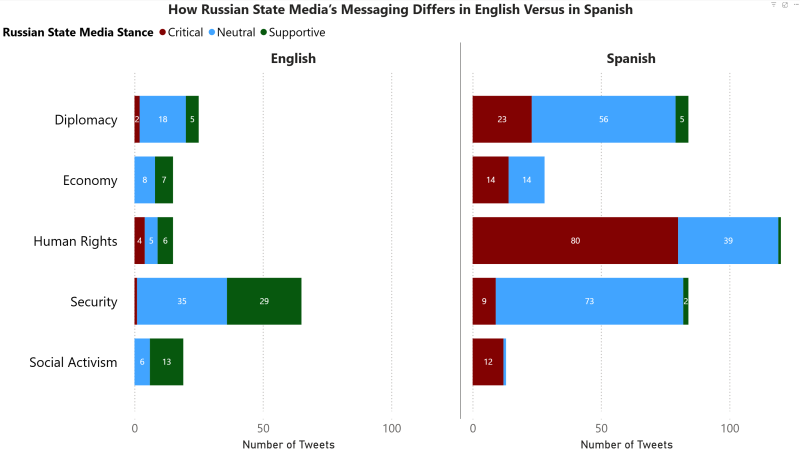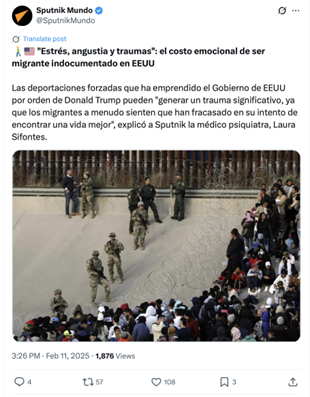Since his first day returning to office, US President Donald Trump has pushed forward on campaign promises to crack down on illegal immigration and secure the southern US border. Trump’s tough stance on immigration has been contentious among Americans and foreign audiences, particularly those in Spanish-speaking countries.
It is well documented that Russian influence actors play audiences on both sides of controversial issues to exacerbate divisions. This malleability is also noticeable in different regional and language-specific versions of Russian state media outlets, where, depending on the target audience, Russian messengers offer differing, if not entirely contradictory, views on world events. Given that Trump’s immigration and border policies are a point of contention between the United States and certain Latin American countries, researchers at ASD analyzed differences in how Russian state media communicated about the issue in English and Spanish.
Methodology
To analyze these variances, ASD collected a sample of approximately 600 Russian state media posts on X about US border policies in English and Spanish published during the Trump administration’s first 100 days in office (January 21–April 30, 2025). Researchers then coded each tweet, including its embedded content, such as videos and links to articles, to catalog whether the tweet presents Trump’s border policies in a supportive, critical, or neutral way. Researchers also categorized the tweets under six themes: security, economy, human rights, diplomacy, social activism, and other. A tweet with multiple themes was put in multiple categories.
The Narrative Divide
Contradictory Stances
Russian state media’s English- and Spanish-language accounts adopted contradictory positions on Trump’s border policies. During the studied period, RT’s and Sputnik’s English-language accounts posted significantly more content that was supportive of Trump’s border policies or portrayed them positively (44%) compared to their Spanish-language counterparts (4%). English-language accounts largely aligned themselves with the Trump administration, pushing narratives that cast migrants as “dangerous criminals”. In some cases, they even promoted falsehoods and conspiracies to stoke outrage (see Thematic Deviations below). RT’s and Sputnik’s Spanish-language accounts also published more content that was critical of Trump’s border policies or portrayed them negatively (38%) in comparison to their English-language counterparts (8%). Spanish-language accounts tried to amplify international criticism of Trump’s immigration policies, highlight their adverse effects on Latin American countries, and call out the policies’ repercussions on human rights (see Thematic Deviations below).

Figure 1: Spanish-language accounts across all themes posted more content that was critical of Trump’s border policies than their English-language counterparts. Similarly, English-language accounts across all themes posted more content that was supportive of the policies than their Spanish-language counterparts.
This contradictory messaging was most apparent when an outlet covered identical issues or incidents in both languages. For example, after Trump shut down the CBP One application, which resulted in the cancellation of thousands of asylum appointments for refugees waiting on the US-Mexico border, RT’s English- and Spanish-language accounts posted identical videos of a refugee crying but with text that provided different framings. RT en Español shared the video to emphasize “despair” over the decision. RT’s English-language service posted the same video, called the refugees “future border-crossers”, and seemingly mocked them for crying “in front of the cameras” and not making it “in time”.

Figure 2: Example of how RT’s English- and Spanish-language accounts cover identical issues with contradictory framings.
In other instances, the bias is more subtle. Sepa Más, a Spanish-language RT channel that launched in December 2022—seemingly to circumvent EU bans—regularly posted news segments about Trump’s border policies that, on the surface, appeared to be impartial but used headlines that negatively framed those policies. These headlines included “Hospitalidad Hostil” (Hostile Hospitality), “Derechos En La Cuneta” (Rights in the Gutter), “Trato Inhumano” (Inhumane Treatment), and “Sin Refugio Seguro” (No Safe Haven).

Figure 3: A Sepa Más segment, headlined “Hostile Hospitality”, negatively frames US border policies and includes a clip of protesters beating a Trump piñata.
Thematic Deviations
In addition to their contradictory stances on Trump’s border policies, Russian state media outlets also greatly deviated on the themes they covered when discussing border-related issues in English and Spanish. The starkest contrast observed is the frequency with which English- and Spanish-language accounts framed Trump’s border policies around human rights. In our data sample, Spanish-language accounts focused on human rights significantly more (32% of posts) than English-language accounts (7%). When Spanish-language accounts brought up human rights, it was usually to characterize Trump’s immigration policies as inhumane. These accounts, for example, claimed the Trump administration “kidnapped” Venezuelan migrants, amplified comments by Colombian President Gustavo Petro comparing the mass deportations to “Nazi Germany”, and circulated videos showing ICE brutality. In the few instances where English-language accounts focused on human rights, there was often a pro-Trump bent, such as amplifying arguments that “ICE saved children” or pushing conspiracies that the Biden administration trafficked migrant children.
ASD also observed differences in how Russia’s English- and Spanish-language state media accounts discussed social activism related to Trump’s border policies. While there were slight differences in the percentage of posts that focused on protests—9% of English-language posts and 3% of Spanish-language posts—their tone was markedly different. All Spanish-language posts on the issue highlighted universal discontent with Trump’s immigration crackdown, while nearly all Englis-language posts were provocative, either mocking liberal activists or painting them as “violent”. These findings correspond to other analyses of Russian state media’s messaging about the anti-ICE protests in Los Angeles earlier this year.

Figure 4: Sputnik Mundo underscores the “emotional toll” Trump’s border policies have caused migrants.

Figure 5: RT en Español reported that Trump’s first 100 days were marked by “deportation, raids, and panic”, and showed a video highlighting violent methods employed by an ICE officer.

Figure 6: An English-language RT post amplifying conspiracies that the Biden administration trafficked migrant children.
Conclusion
Russian state media’s contradictory messaging on Trump’s border policies in English and Spanish is yet another example of how Russian messengers play to different audiences to advance their geopolitical objectives. RT’s and Sputnik’s English-language accounts—which, at least in the United States, primarily target conservatives—aligned themselves with the Trump administration’s stance on immigration, pushing narratives that negatively portrayed migrants and characterized the immigration crackdown as a necessity. Conversely, their Spanish-language accounts—which primarily target Latin American audiences critical of US foreign policy—sought to fuel discontent about Trump’s policies with those who were more likely to sympathize with migrants or feel the repercussions of Trump’s border policy in their home countries. This contradictory communication demonstrates how Russian messengers are exploiting language barriers and differences in geopolitical attitudes to exacerbate friction between the United States and Latin America without alienating their more Trump-friendly US audience.
This article contains substantial research contributions from Nico McCurrach and Lea George.
The views expressed in GMF publications and commentary are the views of the author alone.





